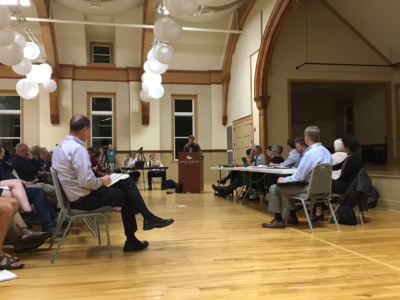The third Vermont Climate Action Commission public hearing took place Thursday night in St. Albans City Hall Auditorium. Vermonters from Franklin, Chittenden and Grand Isle counties came to voice their concerns and make policy recommendations before a panel of 10 of the 21 appointed commissioners. Their task is significant: take the pulse of the public for policy options they can in turn recommend to the Governor that will drive down carbon emissions and grow the economy to the benefit of all Vermonters.
Out of the 44 Vermonters who came to speak before the commission, 30 explicitly recommended funding the solutions with a price on pollution. This has been a theme shared throughout the first three listening sessions. A total of 125 recommendations have been made by Vermonters to this commission, of which 82 have explicitly favored carbon pricing for an overall percentage of 66%. Other frequent recommendations were various regenerative agriculture practices, codifying our renewable energy goals into law, and banning any new development of fossil fuel infrastructure.
The St. Albans hearing builds off momentum for carbon pricing that has been slowly building for years and is a policy that is consistent with the goals set out for the commission, as well as commensurate with the grand challenge the commission is faced with.
The Governor did not make the commissioners’ jobs any easier however. Despite (or more likely, because of) the vast majority of comments made in the first two hearings explicitly in favor of putting a price on carbon pollution, Governor Scott came out with a contentious response on his Facebook page. In doing so, he dismissed the many Vermonters whose recommendations he pursued and he compromised the independence of the commission and the public input process process.
These are just some of the Vermonters the governor disrespected:
Bonnie Filker, a 21 year old UVM Student studying environmental policy shared concerns with the Governor’s reaction to the first two hearings: “it is not appropriate for the Governor to dismiss overwhelming support” for pricing carbon pollution.” And “unfair for old generations living different lifestyles to not respond to climate change because in effect it is taking autonomy away from younger generations” who will be disproportionately affected, many who are faced with the difficult decision whether they should even be having a family.
Daniel Shearer, of Burlington, urged the commissioners to pass on recommendations that are “unprecedented” to match the “unprecedented challenges of our time,” and that there is no way the state is going to meet the goals set by the Comprehensive Energy plan without carbon pricing as a necessary first step.
Jen Wood of Grand Isle points out that there are plenty of examples of non-regressive carbon pricing.
Sandra O’Flaherty of South Hero voiced support for Rep. Diana Gonzáles of Winooski’s carbon dividends bill introduced last year.
Many people pointed to the fact that if we don’t begin investing into policies that will mitigate climate change for the future, the crisis will only become less affordable as it intensifies. Eli Olson of St. Michael’s College spoke of carbon pricing as a consequential investment: “If we don’t pay monetarily now, life will pay in the future.”
Zach Tomanelli of South Burlington:“This can be done. There are a lot of smart, passionate people on this commission who care about this state, our people and our environment. There are a lot of those same types of people in this room tonight – and even more all across Vermont. Let’s get together, listen to each other and figure out how to do this.”

